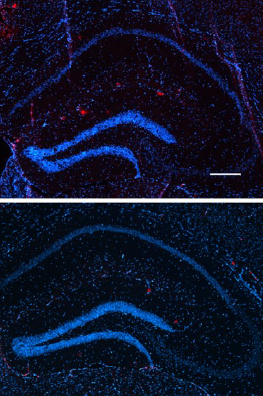Cancer drug shows promise in reversing Alzheimer’s symptoms in mice
February 12, 2012

75% reduction in 14 days of amyloid plaque (red) in the hippocampus of mice treated with bexarotene
Neuroscientists at Case Western Reserve University School of Medicine have found that bexarotene, a drug currently prescribed to treat cancer, appears to reverse Alzheimer’s symptoms in mice.
The results suggest that bexarotene has a significant potential to help the 5.4 million Americans with the progressive brain disease.
“When used in mice, the drug was successful in removing the buildup of amyloid plaque in the brain — a pathological hallmark of Alzheimer’s disease — as well as reversing cognitive symptoms and memory deficits.
Bexarotene even helped restore lost nesting behaviors in mice with Alzheimer’s disease within 72 hours of treatment. The drug also improved the ability of the mice to sense and respond to odors.
“This is an unprecedented finding,” says Paige Cramer, PhD candidate and first author of the study. “Previously, the best existing treatment for Alzheimer’s disease in mice required several months to reduce plaque in the brain.”
Bexarotene has been approved for the treatment of cancer by the U.S. Food and Drug Administration for more than a decade. It has a good safety and side-effect profile, which researchers hope will help speed the transition to clinical trials of the drug.
Ref.: Paige E. Cramer et al., ApoE-Directed Therapeutics Rapidly Clear β-Amyloid and Reverse Deficits in AD Mouse Models, Science, 2012 [DOI: 10.1126/science.1217697]